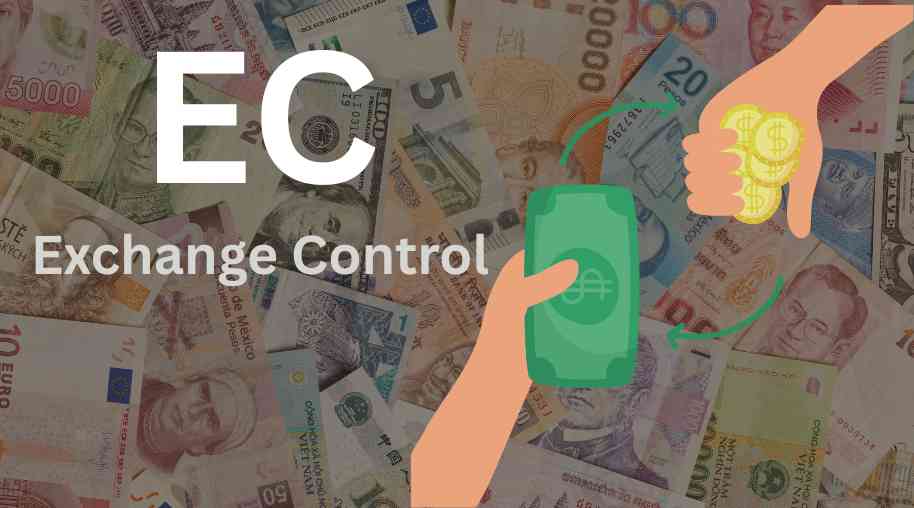EC Full Form-Exchange Control
by Shashi Gaherwar
0 2230
Exchange Control: Definition, Mechanisms, Benefits, and Economic Impact
Introduction
Exchange control refers to government-imposed regulations on currency transactions to manage foreign exchange reserves, stabilize the economy, and protect national financial interests. Countries implement exchange control policies to regulate currency inflows and outflows, prevent capital flight, control inflation, and maintain exchange rate stability.

This article explores the concept of exchange control, how it works, its advantages and disadvantages, and its overall economic impact.
What is Exchange Control?
Exchange control is a set of legal and institutional measures imposed by a country’s central bank or government to regulate the buying, selling, and movement of foreign currency. These measures can restrict currency exchange, international trade, and capital transfers to manage economic stability and trade balances.
Some countries implement strict exchange control policies, while others maintain a more liberal approach to allow free currency exchange in global markets.
How Does Exchange Control Work?
Exchange control operates through various mechanisms, including:
- Fixed Exchange Rates:
- Governments peg their currency to a stronger currency (e.g., USD, EUR) to maintain economic stability.
- The central bank intervenes in foreign exchange markets to uphold the peg.
- Foreign Exchange Reserves Management:
- Central banks control foreign currency reserves to prevent excessive fluctuations.
- These reserves help manage international debt payments and trade balances.
- Restrictions on Currency Exchange:
- Individuals and businesses may need government approval to buy or sell foreign currency.
- Currency exchange limits prevent devaluation and protect domestic currency value.
- Capital Controls:
- Governments regulate foreign investments and capital flows to prevent financial crises.
- Examples include taxes on foreign transactions, investment restrictions, and repatriation limits.
- Trade and Import-Export Controls:
- Exchange control policies may include tariffs, quotas, and subsidies to protect domestic industries.
- Governments regulate foreign trade payments to control currency supply.
Benefits of Exchange Control
Exchange control policies offer several advantages to economies, particularly in developing countries or those facing financial instability:
- Currency Stability:
- Helps prevent extreme exchange rate fluctuations that could impact the economy.
- Protects against speculative attacks on the national currency.
- Prevention of Capital Flight:
- Controls on foreign currency prevent sudden outflows of capital during economic crises.
- Encourages domestic investment instead of offshore transfers.
- Control of Inflation and Price Stability:
- Exchange control limits excessive foreign currency demand, which helps stabilize domestic prices.
- Reduces dependence on volatile global financial markets.
- Improvement of Trade Balance:
- Restrictions on currency exchange help maintain a favorable trade balance.
- Encourages domestic production and reduces reliance on imports.
- Safeguarding Foreign Exchange Reserves:
- Exchange control ensures reserves are adequately available for essential imports and debt repayments.
- Prevents depletion of foreign currency reserves due to excessive outflows.
Disadvantages and Criticism of Exchange Control
While exchange control can benefit an economy, it also has several downsides:
- Market Distortions:
- Artificial exchange rate controls may lead to black markets where foreign currency is traded illegally.
- Price controls on imports and exports can create inefficiencies in the economy.
- Reduced Foreign Investment:
- Strict currency controls may discourage foreign direct investment (FDI).
- Investors prefer markets with freely convertible currencies for ease of transactions.
- Limited Economic Growth:
- Restrictions on capital outflows may slow business expansion and technological advancements.
- Companies may struggle to import necessary raw materials or technology.
- Bureaucratic Challenges and Corruption:
- Exchange control regulations often involve government approvals, licenses, and restrictions that increase bureaucracy.
- Such systems can encourage corruption in currency allocation and trading.
Countries with Exchange Control Policies
Exchange control policies vary from country to country. Some nations maintain strict currency regulations, while others promote free-market currency trading. Examples include:
- China – Uses a controlled exchange rate system and regulates capital outflows through the People’s Bank of China.
- India – Implements partial exchange control through the Reserve Bank of India, with some liberalized policies for businesses.
- Argentina – Has strict capital controls to prevent excessive foreign currency demand.
- Venezuela – Imposes currency exchange restrictions due to economic instability and hyperinflation.
- Russia – Implements controls on foreign exchange during financial crises to prevent capital flight.
Impact of Exchange Control on Global Trade
Exchange control policies influence global trade, investments, and economic relations in several ways:
- Trade Restrictions – Countries with strict exchange control may limit imports and exports, affecting international trade flows.
- Investor Confidence – Foreign investors may avoid countries with restrictive currency policies due to uncertainties in profit repatriation.
- Monetary Policy Influence – Exchange control can impact interest rates, inflation, and economic stability, requiring adjustments in fiscal policies.
Future of Exchange Control
With increasing globalization and digital finance advancements, many countries are shifting toward more flexible exchange rate policies. However, exchange control will continue to play a role in:
- Managing Economic Crises – Governments may impose temporary currency restrictions during financial instability.
- Regulating Digital Currencies – Central banks are exploring regulations on cryptocurrencies and digital assets in exchange control frameworks.
- Balancing Economic Growth and Stability – Policymakers will focus on striking a balance between free-market policies and financial stability.
Exchange control remains a significant economic tool used by governments to stabilize currencies, regulate capital flows, and manage foreign exchange reserves. While it offers advantages like preventing capital flight and controlling inflation, it also poses challenges such as market inefficiencies and reduced foreign investment.
As the global economy evolves, exchange control policies will continue to adapt to new financial realities, including the rise of digital transactions and decentralized financial systems. Countries must carefully design their policies to ensure economic stability while fostering global trade and investment opportunities.
Further Learning Resources
If you’re passionate about building a successful blogging website, check out this helpful guide at Coding Tag – How to Start a Successful Blog. It offers practical steps and expert tips to kickstart your blogging journey!
For dedicated UPSC exam preparation, we highly recommend visiting www.iasmania.com. It offers well-structured resources, current affairs, and subject-wise notes tailored specifically for aspirants. Start your journey today!

Share:









Comments
Waiting for your comments